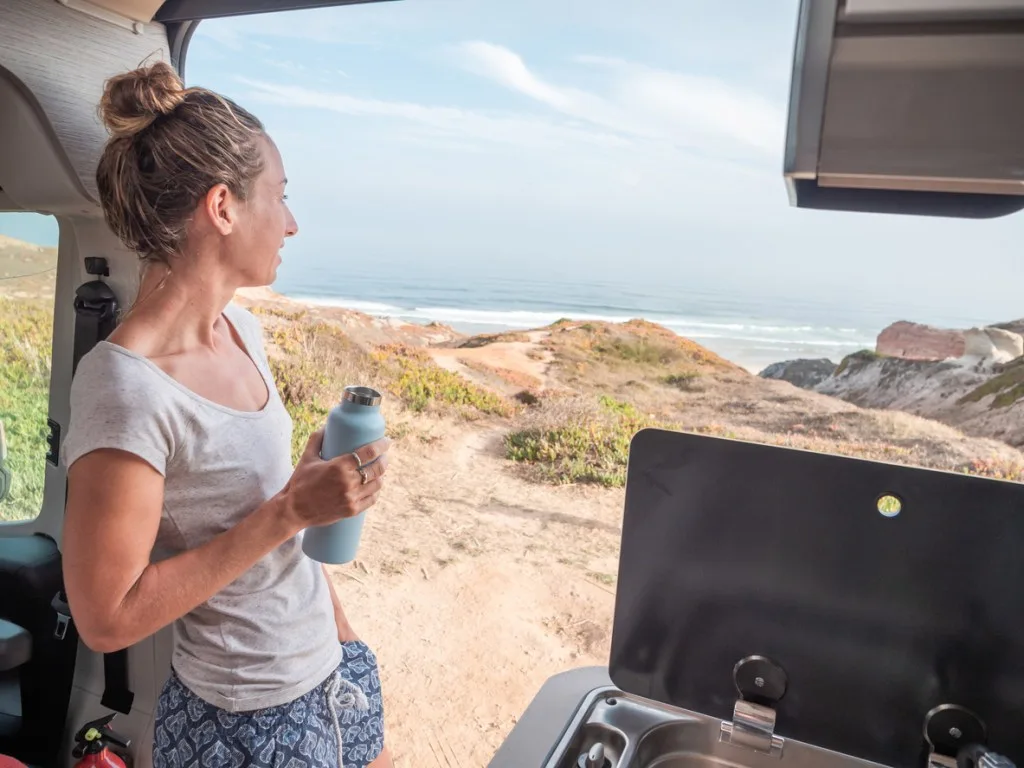Many jump into the RV lifestyle, assuming they’ll save a tremendous amount of money. However, that’s not always the case.
Depending on your lifestyle and travel preferences, RVing can be much more expensive than living in a residential home.
So how cheap can you feasibly live in an RV? Let’s take a look!
Can You Live in an RV Full Time?
Many people across the country live in their RVs full time. However, there might be restrictions depending on where you live. Areas with a homeowners association or code enforcement will often also have specific requirements for living in an RV.
Restrictions may limit how many days you can live in an RV or what utilities or dwellings need to be present on the property. It’s best to confirm the legalities of living in your RV before getting too far along in the process.
If you plan to travel full time in your RV, there is typically nothing stopping you from doing so. It’s possible even if you have kids. If you have school-age kids, you’ll want to check any specific home school requirements for your state.
Many families will even change their domicile to homeschool-friendly states like Texas and Florida to make homeschooling easier.

How Much Does it Cost Per Month to Live in an RV?
The costs to live in an RV for a month can vary significantly from one RVer to the next. Depending on your camping style, you can pay anywhere from $15 per night to $80 and up per night for a campsite. Some RV parks and campgrounds that allow extended stays will charge guests their electrical usage.
This means you can typically spend $400 to $2000+ on camping fees if you’re only staying in campgrounds or RV parks.
You’ll need to consider the costs of your RV, tow vehicle, and insurance on both. Depending on your setup, you can easily pay $1200 and upwards per month. Don’t forget you’ll also have to pay for fuel and maintenance on both your RV and tow vehicle.
Even without loans for their tow vehicle or RV, you may have difficulties keeping your monthly expenses below $2000. The more people in your family, the more you’ll be spending on food, entertainment, and other miscellaneous costs.
Is it Cheaper to Live in an RV Than a Home?
Living in an RV can be cheaper than living in a home, but not always. If you’ve seen the price tags on RVs and trucks lately, you know they’re not cheap. Campground fees are also increasing across the country with the heightened popularity of RVing.
RVing is often cheaper than living in a home when you’re stationary. If you own the land or can get a great deal renting a long-term campsite, you can save money.
Some RVers hire a driver to tow their RV to a permanent site and don’t even own a vehicle capable of pulling it. If you’re not planning to move your RV or only move it occasionally, you don’t need an expensive truck.
Depending on your circumstances, it can be cheaper to live in an RV than a home. However, it doesn’t take much to eat up the savings, especially if you’re expecting to spend every night in a luxury RV resort or do activities at every stop while traveling in your RV.

How Can I Live in an RV Cheaply?
If you’re hoping to embrace the RV life but do it cheaply, we have a few tips.
Budget Appropriately
One of the worst things you can do is under budget. You may be fine for a month or two, but the expenses of life on the road will eventually catch up to you. It would be best to plan for consistent expenses like truck/RV payments, campsite fees, and food.
You should also plan for the unexpected events that are a part of the RV lifestyle. It’s not a question of if you will experience an unexpected expense, but when.
Tires fail, things break, and even minor issues with your RV can come with hefty price tags. We highly suggest having a generous emergency fund before hitting the road. Many RVers had their travel plans derailed by an unexpected event, and we don’t want you to be one of them.
Look For Cheap or Free Campsites
A great way to save on your monthly budget is to look for cheap or free campsites. There are thousands of free campsites managed by the Bureau of Land Management (BLM) and the United States Forest Service (USFS). You can even find free campsites near popular tourist locations like national parks.
Many RVers get memberships to programs like Thousand Trails, Boondockers Welcome, and Harvest Hosts. You can save thousands of dollars each year in camping if you learn to use these programs to their full potential. You can find hundreds of locations across the country that are a part of these various programs.
Don’t Miss It: Here are the 21 best free campsites in America.
Learn How to Do Repairs
To keep your RV rolling down the road, you’ll need to do regular maintenance and address necessary repairs as soon as possible. You’ll spend a fortune if you have to your RV to the repair shop for every piece of routine maintenance.
Learning how to do repairs yourself will not only save you a tremendous amount of money but help you avoid your RV sitting in the repair shop. Once you work on your RV, the simplicity of some of the maintenance and repairs might surprise you. However, you also want to know your limits and avoid turning a minor repair into an expensive mistake.
Cook Versus Eating Out
You can prepare food for a fraction of the cost compared to going out to eat. We’re not saying you should never go out to eat. If you’re traveling through an area that’s known for its food, it would be a mistake not to give it a try. However, be particular about where and when you’re going out to eat when you do.
Plan and prepare lunches and snacks when you’ll be spending the day adventuring. Quick stops for fast food can eat away at your monthly budget. Get the most bang for your buck by getting groceries and cooking instead of going out to eat.

What Is the Cheapest Place to Live in an RV?
One of the most budget-friendly places to live in an RV is Quartzsite, Arizona. You can find full hook-up sites for under $300 per month during the off-season. During the busy season (January/February), sites are typically under $500 per month.
This is half of what you’d likely find in other places of the country. Quartzsite comes alive during the winter months due to its RV-friendly atmosphere and the opportunities to boondock.
However, if privacy is what you’re looking for, boondocking is the way to go. This may require you to invest in solar for your RV or a generator, but it is highly cost-effective. You’ll need to obey all stay requirements and move as necessary, but many RVers boondock on public lands to save thousands of dollars each year.
Is RV Living Worth it?
RV living is a fantastic way to experience the world around you. However, make sure you manage your expectations and go into the new life with a stack of cash or a steady stream of income.
You don’t want to run out of money when you’re on the other side of the country or in the middle of nowhere. Have an emergency fund and learn to tackle RV projects on your own.
Get creative about minimizing your expenses, so you have more to invest in your adventures. What’s your favorite money-saving hack?
Discover the Best Free Camping Across the USA
To be honest with you, we hate paying for camping. There are so many free campsites in America (with complete privacy).
You should give it a try!
As a matter of fact, these free campsites are yours. Every time you pay federal taxes, you’re contributing to these lands.
Become a FREE CAMPING INSIDER and join the 100,000 campers who love to score the best site!
We’ll send you the 50 Best Free Campsites in the USA (one per state). Access the list by submitting your email below:
Having RV’d for 13 years and boondocked the majority of that time I can tell you that if your under 50 years old. You’ll need a minimum of a million dollars to live the rest of your life in an RV. The cost of living keeps going up and you’ll will always have to have medical insurance. Which the older you get the more medical problems start showing up. You’ll also need vehicle insurance, and it’s wise to pay a company like Coach-net, Good Sam’s, or AAA because I can guarantee you’ll eventually need they’re help. There’s also the cost of propane, gasoline, But the biggest cost is repairs to your rig for the fact that nothing holds up to all the roads that 18 wheelers have wore out over the last 50 years. I’m still wondering why Drivin’ and vibin’ quit RVing after a few short years if it was so great.
We live in a self-converted promaster cargo van. It’s the only way to go, imo.
1. Professional RV’s are designed for the campground whereas our van is designed for boondocking
2. We know how to repair everything because we built it!
3. Our van can withstand the rigors of travel.
A major budget saver for us is the federal lands pass. My S.O. got talked into buying the geezer pass not long after he turned 62. At the time it was only $10 and good for a lifetime. Cuts camping fees in half at federal campgrounds (national parks, national forests, corps of engineers, blm, and even the TVA) as well as eliminating admission fees at the parks that charge them. I know it costs more now but it’s an amazing deal that pays for itself in a remarkably short time. So is the annual pass for younger folk if people plan to visit any of the big name parks, like Grand Canyon or Yosemite.
We also figured out just what amenities were important to us if we planned to stay at an rv park and which weren’t. Why pay to stay at a park that includes things like a swimming pool or a clubhouse with billiard tables if you know you won’t use them?